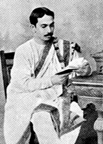Dutta, Satyendranath

Dutta, Satyendranath (1882-1922) poet, born in the village of Nimta near Kolkata on 11 February 1882. His father Rajaninath Dutta, who hailed from the village of Chupi in Burdwan, was a trader. His grandfather, akshay kumar datta,was editor of the tattvabodhini patrika.
After matriculating from Central Collegiate School in Kolkata in 1899, Satyendranath passed FA from the General Assembly’s Institution in 1901. He sat for the BA examination but was unsuccessful. He joined his father, but soon devoted himself exclusively to writing poetry. Satyendranath was one of the influential poets who wrote for the bharati. He was initially influenced by michael madhusudan dutt, akshay kumar baral, and Debendranath Sen, but later turned to rabindranath tagore. Nevertheless, he maintained his distinctive poetic style.
He was well known for his material skill, and devised several metres while keeping intact the sound system and phrases of Bangla. This is why he was known as 'the magician of metrics' or 'the king of metres'. His famous essay, Chhanda-sarasvati, on metrics, was published in the Baishakhi number of the Bharati in 1918. He was the first to compose poems using words from Persian and Arabic and thus expanded the versatility of the language. He translated poems from Arabic, Persian, Chinese, Japanese, English and French, thus giving Bangla readers a taste of foreign poetry and metres. He tried to bridge the gap between bangla literature and world literatures. The main themes of his poetry revolve round patriotism, humanism, tradition, worship of power, etc. He also wrote poems on the lower classes, such as the sweeper community.
Satyendranath Dutta wrote under several pennames: Nabakumar, Kaviratna, Ashitipar Sharma, Tribikram Varman, Kalamgir etc. Some noted collections of his poems are Savita (The Sun, 1900), Sandhiksan (1905), Venu O Vina (1906), Hom Shikha (1907), Phuler Phasal (1911), Kuhu O Keka (1912), Tulir Likhan (1914), Abhra-Avir (1916), Hasantika (1919), Bela Sheser Gan (1923), Biday-Arati (1924), Kavyasavchayan (1930), Shishu-Kavita (1945) etc. His volumes of verse translations include Tirtharenu (1910), Tirtha-Salil (1918) and Mani Mavjusa (1915). His other writings are Janmaduhkhi (novel, 1912), Chiner Dhup (essays, 1912) and Rabgamalli (play, 1913). He died on June 25 in 1922. [Md Harun-or-Rashid]
